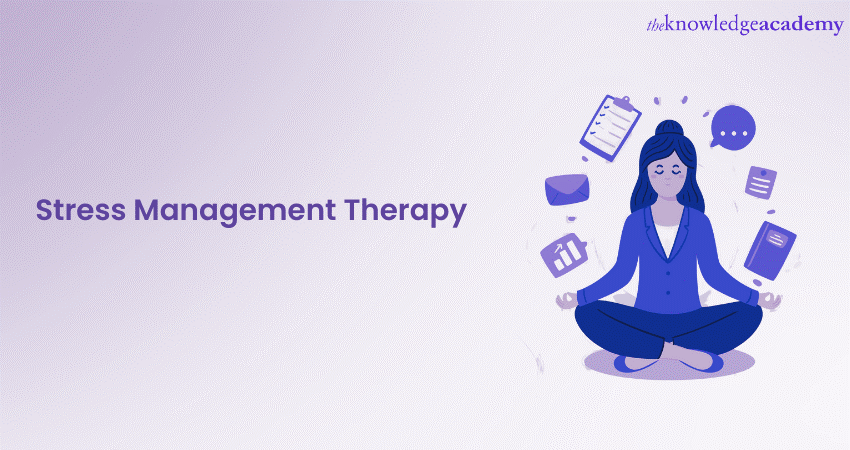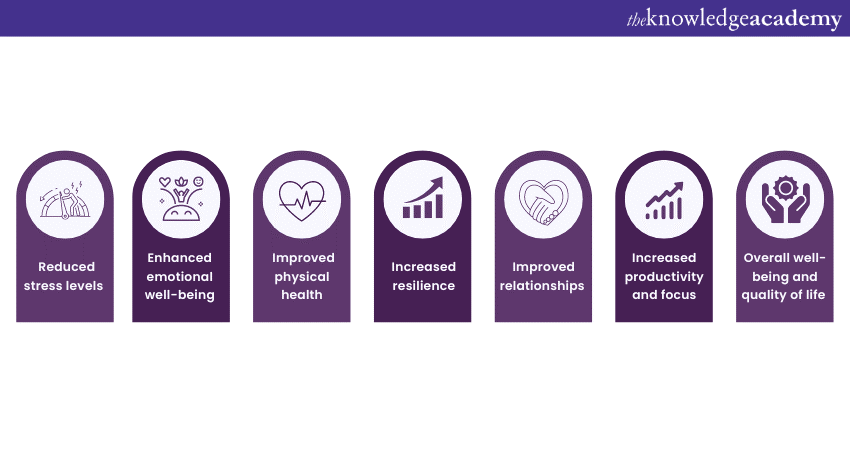We may not have the course you’re looking for. If you enquire or give us a call on 01344203999 and speak to our training experts, we may still be able to help with your training requirements.
Training Outcomes Within Your Budget!
We ensure quality, budget-alignment, and timely delivery by our expert instructors.

Stress is a common health problem that affects our mental well-being. We need to learn how to cope with the stressors from work, relationships, and other areas. Stress Management Therapy can help us do that.
According to Statista, about 26% of people worldwide are stressed for various reasons. We need to address the challenges that stress brings to our lives. Want to improve your well-being? Start by learning about the benefits of therapy. This blog will teach you about Stress Management Therapy, its techniques, and its advantages.
Table of contents
1) What is stress?
2) What are the causes of stress?
3) What is Stress Management Therapy?
4) What are the benefits of Stress Management Therapy?
5) Conclusion
What is stress?
Stress is a physical reaction caused by hormones. When we encounter difficulty or expectation, our brains produce adrenaline and cortisol, which enable us to handle the pressure. It is a physical response that activates our ‘fight or flight’ mode, where we gain a boost of energy and focus.
Hence, stress can be helpful in some situations. It can make us more attentive, alert, competent and motivated.
However, stress can also be detrimental when it lasts for too long, and we feel stressed even when there is no real danger. It can harm our health, mood and performance.
What are the causes of Stress?
Stress is caused by ‘stressors’, which are situations or events that require something from you.
They can be positive or negative, such as getting married, getting a promotion, having financial problems, having relationship issues or having health issues. These are called ‘external stressors’.
There are also ‘internal stressors’, which are things that you worry or feel anxious about in your mind, not because of an external situation. For example, imaginary scenarios or pessimistic attitudes.
Moreover, there are different levels of stress that people can tolerate or enjoy. Some people can handle or even thrive on high levels of stress regularly. But sometimes, something that may seem trivial to others can feel extremely stressful to them. Likewise, some people can find many things stressful that others find easy or fun.
Stress is influenced by various external and internal factors, and each person’s individual characteristics will determine what stresses them out or not.
Learn how emotional intelligence can be applied in organisations with our Emotional Intelligence Training.
What is Stress Management Therapy?
Stress Management Therapy is the application of methods, plans, or tools to lower, avoid, or deal with stress. Some examples are psychotherapy (talking to a therapist) and relaxation training.
Stress therapy can help when someone is:
a) Feeling stressed for a long time
b) Feeling high levels of stress
c) Facing changes or challenges in life
d) Expecting changes or challenges in the future
There are different types of Stress Management Therapy that can help you cope with stress. Some of them are:
a) Cognitive-Behavioural therapy (CBT): This is a type of therapy that helps you identify and change negative thoughts and behaviours that contribute to stress. CBT can also teach you coping skills and relaxation techniques to deal with stress.
b) Mindfulness-based therapy: This is a type of therapy that helps you focus on the present moment and accept your thoughts and feelings without judgment. Mindfulness can help you reduce stress by increasing your awareness and reducing your reactivity.
c) Acceptance and Commitment Therapy (ACT): This is a type of therapy that helps you accept what you cannot control and commit to actions that align with your values. ACT can help you cope with stress by increasing your psychological flexibility and reducing avoidance.
d) Dialectical Behaviour Therapy (DBT): This is a type of therapy that helps you balance your emotions and thoughts and improve your interpersonal skills. DBT can help you cope with stress by teaching you four skills: mindfulness, distress tolerance, emotion regulation, and interpersonal effectiveness.
Take the next step towards a more fulfilling and resilient life. Register for our Personal Development Courses now!
What are the benefits of Stress Management Therapy?
Seeking therapy can offer numerous benefits that can positively impact various aspects of an individual's life. The following are some of the key Benefits of Stress Management Therapy:

Reduced stress levels
The primary goal of therapy is to diminish stress levels. By learning effective techniques to identify and manage stress, individuals can experience a significant decrease in the intensity of stressors.
Stress Management Therapy equips individuals with the tools necessary to navigate and mitigate stress effectively. It does so by implementing relaxation techniques, cognitive restructuring, and coping strategies.
Enhanced emotional well-being
Chronic stress can take a toll on one’s emotional well-being, leading to symptoms such as depression, anxiety, and irritability. Seeking therapy helps individuals develop emotional resilience and improve their capability to cope with challenging situations.
They get to address negative thought patterns, explore emotions, and practise mindfulness. As a result, individuals can enhance their emotional well-being and cultivate a greater sense of inner peace and stability.
Improved physical health
Stress can also significantly impact an individual’s physical health, contributing to conditions such as high blood pressure, heart disease, and compromised immune function. Stress Management Therapy encourages individuals to adopt healthier lifestyle choices, including regular exercise, proper nutrition, and adequate sleep.
It helps them prioritise self-care and manage stress effectively. Therefore, individuals can enhance their physical health, boost immune function, and lower the risk of stress-related illnesses.
Increased resilience
Resilience refers to an individual's ability to bounce back and adapt to adversities. Seeking therapy helps individuals develop resilience by building coping mechanisms and fostering a positive mindset.
Through cognitive restructuring, individuals learn to reframe negative thoughts, challenge self-limiting beliefs, and develop a more optimistic outlook. This increased resilience enables individuals to navigate stressful situations more effectively and bounce back from setbacks with greater ease.
Improved relationships
Excessive stress can strain relationships with family, friends, and colleagues. Therapy emphasises the importance of effective communication, assertiveness, and conflict-resolution skills.
By improving interpersonal skills and managing stress, individuals can enhance their relationships, foster better connections, and reduce relationship conflicts caused by stress-induced tension and emotional strain.
Are you struggling to manage your time effectively? Register for our Time Management Training now!
Increased productivity and focus
When stress levels are high, it can significantly impact productivity and focus. Stress Management Therapy equips individuals with strategies to manage time effectively, set priorities, and maintain a healthy work-life balance.
By reducing stress and enhancing mental clarity, individuals can improve their productivity, make better decisions, and achieve great success in their professional and personal lives.
Overall well-being and quality of life
Ultimately, therapy aims to improve overall well-being and enhance the quality of life. By reducing stress, individuals can experience greater contentment, satisfaction, and a sense of fulfilment.
Stress Management Therapy also provides individuals with the tools and skills to navigate life’s challenges more effectively, fostering a more balanced and joyful existence.
Are you struggling to manage your time effectively? Register for our Time Management Training now!
Conclusion
Stress Management Therapy offers a holistic approach to coping with trauma and reducing stress. By utilising a combination of techniques, individuals can efficiently manage their stress levels and improve their overall well-being. Prioritising self-care and seeking professional help is essential to achieve long-term Stress Management goals.
Gain a deep understanding of various techniques used in Stress Management with our Stress Management Courses.
Frequently Asked Questions

There are various alternative or complementary therapies that can help reduce stress and improve well-being. Some examples are yoga, meditation, acupuncture, aromatherapy, herbal remedies, and mindfulness. These therapies can help you relax, calm your mind, balance your emotions, and cope with challenges.

Stress Management Therapy can benefit your career by improving your mental health, performance, productivity, and relationships at work. By learning to manage stress better, you can avoid burnout, anxiety, depression, and conflicts that can affect your work quality and satisfaction.

The Knowledge Academy takes global learning to new heights, offering over 30,000 online courses across 490+ locations in 220 countries. This expansive reach ensures accessibility and convenience for learners worldwide.
Alongside our diverse Online Course Catalogue, encompassing 17 major categories, we go the extra mile by providing a plethora of free educational Online Resources like News updates, Blogs, videos, webinars, and interview questions. Tailoring learning experiences further, professionals can maximise value with customisable Course Bundles of TKA.

The Knowledge Academy’s Knowledge Pass, a prepaid voucher, adds another layer of flexibility, allowing course bookings over a 12-month period. Join us on a journey where education knows no bounds.

The Knowledge Academy offers various Personal Development courses, including Stress Management, Time Management and Attention Management Training. These courses cater to different skill levels, providing comprehensive insights into Stress Management.
Our Business Skills blogs covers a range of topics related to Stress Management, offering valuable resources, best practices, and industry insights. Whether you are a beginner or looking to advance your Business skills, The Knowledge Academy's diverse courses and informative blogs have you covered.
Upcoming Business Skills Resources Batches & Dates
Date
 Stress Management Course
Stress Management Course
Fri 17th Jan 2025
Fri 21st Mar 2025
Fri 16th May 2025
Fri 18th Jul 2025
Fri 19th Sep 2025
Fri 21st Nov 2025







 Top Rated Course
Top Rated Course



 If you wish to make any changes to your course, please
If you wish to make any changes to your course, please


